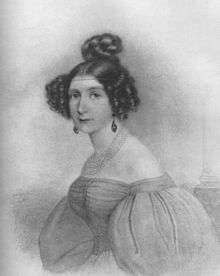Elisa Radziwill
| Elisa Radziwill | |||||
|---|---|---|---|---|---|
 | |||||
| Born |
28 October 1803 Berlin | ||||
| Died |
27 August 1834 (aged 30) Bad Freienwalde | ||||
| |||||
| House | House of Radziwiłł | ||||
| Father | Prince Antoni Radziwiłł | ||||
| Mother | Princess Louise of Prussia | ||||
| Religion | Calvinism | ||||
Princess Elisa Radziwill (Elisa Friederike Luise Martha; Polish: Eliza Fryderyka Luiza Marta Radziwiłł; 28 October 1803, Berlin – 27 August 1834, Bad Freienwalde) was a member of Polish high nobility of royal ancestry. She was the desired bride of Prince William of Prussia, who later became William I, German Emperor, but they were not allowed to marry.
Life
Elisa was a daughter of Prince Antoni Radziwiłł and Princess Louise of Prussia, niece of King Frederick the Great and a relative of the Prussian Royal Family. Prince William, her second cousin once removed and the heir presumptive of the Prussian throne, met with and fell in love with her.
William was expected to marry and produce further heirs. His father and her kinsman King Frederick William III were fond of the relationship between Wilhelm and Elisa, but some in the Prussian court had discovered historical allegations that her ancestors had bought their princely title from Maximilian I, Holy Roman Emperor. In the eyes of certain people, she was not deemed of sufficiently high nobility to marry the heir to the Prussian throne (Elisa was not royal, because her father was not a reigning prince).[1] William's older brother, Frederick William IV of Prussia was married to Elisabeth Ludovika of Bavaria, and Elisabeth was descended from both Bogusław Radziwiłł and Prince Janusz Radziwiłł.
Thus in 1824, the King of Prussia turned to the childless Emperor Alexander I of Russia to adopt Elisa, but the Russian ruler declined. The second adoption plan by Elisa's uncle, Prince Augustus of Prussia, likewise failed as the responsible committee considered that adoption "does not alter the blood" (a principle which governs noble and royal connections to the present day). Another factor was the influence of the Mecklenburgish kinsmen of the deceased Queen Louise in the German and Russian courts who were not fond of Elisa's father and opposed the possible marriage.[2]
Eventually, in June 1826, Wilhelm's father was obligated to demand the renunciation of a potential marriage to Elisa. Wilhelm spent the next few months looking for a more suitable bride, but did not relinquish his emotional ties to Elisa. Eventually, Wilhelm asked for the hand of Augusta of Saxe-Weimar, fourteen years his junior, in marriage on 29 August 1826 (in writing and through the intervention of his father). Wilhelm saw his cousin, Elisa, for the last time in 1829.
It is alleged that Elisa had an illegitimate daughter by Wilhelm who was brought up by Joseph and Caroline Kroll, owners of the Kroll Opera House in Berlin, and was given the name Agnes Kroll. She married a Carl Friedrich Ludwig Dettman (known as “Louis”) and emigrated to Sydney Australia in 1849. They had a family of 3 sons and 2 daughters. Agnes died in 1904. The supporting evidence, including DNA evidence, is given in “Agnes the Secret Princess - An Australian Story” by B. Dettman and J. Stevens (Xlibris 2017).
Elisa was later engaged to Prince Friedrich of Schwarzenberg, but the engagement failed. She died, unmarried, in 1834, of tuberculosis while at a spa seeking a cure.
Historian Karin Feuerstein-Prasser has pointed out, on the basis of evaluations of the correspondence between both fiancées, the different expectations Wilhelm had of both marriages: he wrote to his sister, Czarina Alexandra Feodorovna (Charlotte of Prussia), wife of Czar Nicholas I of Russia, regarding Elisa Radziwill, that "One can love only once in life, really", but confessed regarding Augusta that "the princess is nice and clever, but she leaves me cold." Though Augusta was in love with her future husband and hoped for a happy marriage, theirs was a troubled relationship; Elisa Radziwill was aware of this, and she believed that she herself would have been a better wife to the Prussian prince.
Ancestry
| Ancestors of Elisa Radziwill | ||||||||||||||||||||||||||||||||||||||||||||||||||||||||||||||||||||||||||||||||||||||||||||||||||||||||||||||||||||||||||||||||||||||||||||||||||||||||||||||||||||||||||||||||||||||||||||||||||||||||||||||||||||||||||||||||||||||||||||||||||||||||||||||||||||||||||||||||||||||||||||||||||||||||||||||||||||||||||||||||||||||||||||||||||||||||||||||||||||||||||||||||||||||||||||||||||||||||||||||||||||||||||||||||||||||||||||||||||||||||||||||||||||||||||||||||||||||||||||||||||||||||||||||||||||||||||||||||||||||||||||||||||||||||||||||||||||||||||||||||||||||||||||||||||||||||||||||||
|---|---|---|---|---|---|---|---|---|---|---|---|---|---|---|---|---|---|---|---|---|---|---|---|---|---|---|---|---|---|---|---|---|---|---|---|---|---|---|---|---|---|---|---|---|---|---|---|---|---|---|---|---|---|---|---|---|---|---|---|---|---|---|---|---|---|---|---|---|---|---|---|---|---|---|---|---|---|---|---|---|---|---|---|---|---|---|---|---|---|---|---|---|---|---|---|---|---|---|---|---|---|---|---|---|---|---|---|---|---|---|---|---|---|---|---|---|---|---|---|---|---|---|---|---|---|---|---|---|---|---|---|---|---|---|---|---|---|---|---|---|---|---|---|---|---|---|---|---|---|---|---|---|---|---|---|---|---|---|---|---|---|---|---|---|---|---|---|---|---|---|---|---|---|---|---|---|---|---|---|---|---|---|---|---|---|---|---|---|---|---|---|---|---|---|---|---|---|---|---|---|---|---|---|---|---|---|---|---|---|---|---|---|---|---|---|---|---|---|---|---|---|---|---|---|---|---|---|---|---|---|---|---|---|---|---|---|---|---|---|---|---|---|---|---|---|---|---|---|---|---|---|---|---|---|---|---|---|---|---|---|---|---|---|---|---|---|---|---|---|---|---|---|---|---|---|---|---|---|---|---|---|---|---|---|---|---|---|---|---|---|---|---|---|---|---|---|---|---|---|---|---|---|---|---|---|---|---|---|---|---|---|---|---|---|---|---|---|---|---|---|---|---|---|---|---|---|---|---|---|---|---|---|---|---|---|---|---|---|---|---|---|---|---|---|---|---|---|---|---|---|---|---|---|---|---|---|---|---|---|---|---|---|---|---|---|---|---|---|---|---|---|---|---|---|---|---|---|---|---|---|---|---|---|---|---|---|---|---|---|---|---|---|---|---|---|---|---|---|---|---|---|---|---|---|---|---|---|---|---|---|---|---|---|---|---|---|---|---|---|---|---|---|---|---|---|---|---|---|---|---|---|---|---|---|---|---|---|---|---|---|---|---|---|---|---|---|---|---|---|---|---|---|---|---|---|---|---|---|---|---|---|---|---|---|---|---|---|---|---|---|---|---|---|---|---|---|---|---|---|---|---|---|---|---|---|---|---|---|---|---|---|---|---|---|---|---|---|---|---|---|---|---|---|---|---|---|---|---|---|---|---|---|---|---|---|---|---|---|---|---|---|---|---|---|---|---|---|---|---|---|---|---|---|---|---|---|---|---|---|---|---|---|---|---|---|---|---|---|---|---|---|---|---|---|---|---|---|---|---|---|---|---|---|---|---|---|---|---|---|---|---|---|---|---|---|---|---|---|---|---|---|---|---|---|---|---|---|---|---|---|---|---|
| ||||||||||||||||||||||||||||||||||||||||||||||||||||||||||||||||||||||||||||||||||||||||||||||||||||||||||||||||||||||||||||||||||||||||||||||||||||||||||||||||||||||||||||||||||||||||||||||||||||||||||||||||||||||||||||||||||||||||||||||||||||||||||||||||||||||||||||||||||||||||||||||||||||||||||||||||||||||||||||||||||||||||||||||||||||||||||||||||||||||||||||||||||||||||||||||||||||||||||||||||||||||||||||||||||||||||||||||||||||||||||||||||||||||||||||||||||||||||||||||||||||||||||||||||||||||||||||||||||||||||||||||||||||||||||||||||||||||||||||||||||||||||||||||||||||||||||||||||
References
Sources
- Fleming, Patrica H. (June 1973). "The Politics of Marriage Among Non-Catholic European Royalty". Current Anthropology. 14: 231–249. doi:10.1086/201323.
External links
| Wikimedia Commons has media related to Elisa Radziwiłł. |